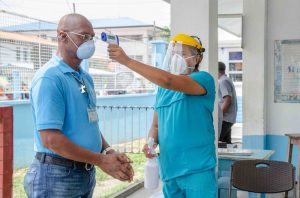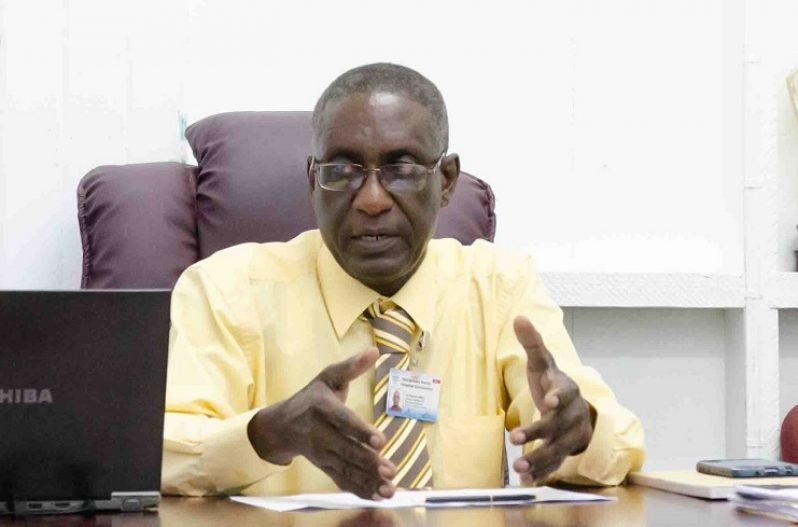…as hospital battles increase in COVID-19 cases
By Navendra Seoraj
THE Georgetown Public Hospital Corporation (GPHC) has written to the Ministry of Public Health, requesting the aid of foreign medical specialists to assist in the delivery of care, amidst the Novel Coronavirus (COVID-19) pandemic.
This call for assistance comes at a time when a study, done by the Pan American Health Organisation (PAHO), found that Guyana could have as many as 20,000 COVID-19 cases in a month. “We are looking for persons who are specialised, like intensivists and nurses who are trained in intensive care…The main task of GPHC, at this time, would be to manage patients who are critically ill,” said GPHC’s Director of Medical and Professional Services, Dr. Fawcett Jeffery, during an exclusive interview with the Guyana Chronicle, on Thursday.

He said the hospital was asked to furnish the public health ministry with a list of the types of specialised persons who would be needed to aid in the fight against COVID-19. The list has since been provided to the ministry. Just last week, Guyana’s Caribbean counterpart, Barbados, had welcomed about 100 Cuban medical practitioners to its shores, as it continues to combat COVID-19. Other countries, such as Italy, which has been devastated by the disease, had also received assistance from Cuban doctors and health workers.
Although Guyana has so far not been hit by the pandemic as hard as other countries, the possibility remains that there could be a spike in cases and even deaths.
The Ministry of Public Health, using the PAHO/WHO method, had initially projected 1,400 cases, but a recent study done by PAHO/WHO found that with every case, another 2.5 persons will be affected within five days if there is no partial lockdown, and if persons do not exercise effective social distancing. “That 2.5, if I infect you, you infect 2.5 others and they infect another 2.5. Within a month we will get over 20,000; it is a simple model but it makes a lot of sense,” said PAHO/WHO Resident Representative, Dr. William Adu-Krow, in a recent News Room report.
And should this happen, Dr. Adu-Krow said, five per cent or 1000 of those infected would need intensive care, and Guyana simply does not have the capacity for this.
“We recognise that, if it (COVID-19) gets bad, we will need a step down unit…we would not be able to take the ones who are not so bad and send them to an institution that may be also filled…that is why the ministry of health is also in the process of establishing a COVID
hospital,” said Dr. Jeffery.
Step Down Units (SDUs) provide an intermediate level of care between the Intensive Care Units (ICUs) and the general medical-surgical wards. These units, which are also commonly referred to as intermediate care units and transitional care units, are found in many, but not all, hospitals in developed nations.
In addition to the SDU, Dr. Jeffery believes that if the COVID-19 hospital becomes a reality, it will take the load off of GPHC and allow the hospital to focus more on the severe cases.
It was reported that the former Ocean View International Hotel has been identified as a dedicated facility for incubation, isolation, quarantine and medical attention for persons diagnosed with, or suspected to have COVID-19. The decision to transform the hotel facility into a “COVID-19 hospital” was made by the government, through the National COVID-19 Task Force, which is being chaired by Prime Minister Moses Nagamootoo.
“If that becomes a reality it will offload patients from GPHC and we will be able to send the less severe cases there…we need to work as a team or it (COVID-19) will devastate our nation,” said Dr. Jeffery.
GPHC WAS PREPARED
While a lot is needed to be done, the director of medical and professional services said GPHC was fairly prepared to deal with the COVID-19 pandemic.
In March 2019, at least six persons were hospitalised following what appeared to be an outbreak of a flu-like illness at the Chinese-owned Guyana Manganese Inc. in Region One (Barima-Waini).
The workers of the company, mainly Chinese nationals, were initially admitted to GPHC with fever, headache, and joint pain, mild shortness of breath, unstable vital signs and moderate to severe respiratory syndrome.
“We had to get ourselves ready and set up isolation areas…that was a learning curve and when COVID was coming we were better prepared to get things on stream, but every day we are learning,” said Dr. Jeffery.
The developed world was caught off-guard by COVID-19, but in his estimation, Dr. Jeffery believes that GPHC was a little more prepared despite the country’s economic problems. The hope, however, remains that the situation will not get “out of hand” because Guyana is not economically strong as other countries, to deal with a surge in cases.
As it is now, he said GPHC is equipped with enough Personal Protective Equipment (PPE) to handle cases of COVID-19, but there is always a need for more.
Globally, there are 1, 353, 361 cases of COVID-19, with 79,235 deaths. And, with no approved treatment or cure, there is no assurance that persons will survive after contracting the disease. In the absence of approved medication, governments and authorities across the world have employed a number of preventative measures to contain the spread of the disease.
Locally, the government had extended its emergency measures to combat the dreaded disease, with the imposition of a 12-hour curfew on citizens. These emergency measures were taken pursuant to paragraphs (1) and (2) (b) of the directions issued by the President, in accordance with the Public Health Ordinance, Cap. 145, and published in the Official Gazette, Legal Supplement B on March 16 2020.
The measures at reference took effect from April 3, 2020, and will last one month, unless earlier terminated, extended or amended by notice of the Minister of Public Health, after an assessment of the prevailing public health conditions.
The public health ministry, and, by extension, the government, had already employed a number of measures to curb the spread of the disease. The existing efforts, such as the COVID-19 hotline, were supplemented after the ministry rolled out a self-test APP.
Through the app, persons are able to self-test and upload their information, which will go directly to the ministry’s surveillance team. Persons will then be contacted by the team if deemed necessary. Persons can access the app at COVID-19.health.gov.gy.
According to the World Health Organisation (WHO), COVID-19 is an infectious disease caused by a newly-discovered coronavirus. WHO said most people infected with the COVID-19 virus will experience mild to moderate respiratory illness and recover without requiring special treatment. Older persons and those with underlying medical problems such as cardiovascular disease, diabetes, chronic respiratory disease, and cancer, are more likely to develop serious illness.
The WHO believes that the best way to prevent and slow down transmission is to be well informed about the virus, the disease it causes and how it spreads.
“Protect yourself and others from infection by washing your hands or using an alcohol-based rub frequently and not touching your face. The COVID-19 virus spreads primarily through droplets of saliva or discharge from the nose when an infected person coughs or sneezes, so it’s important that you also practise respiratory etiquette (for example, by coughing into a flexed elbow),” the WHO has advised.



.jpg)








